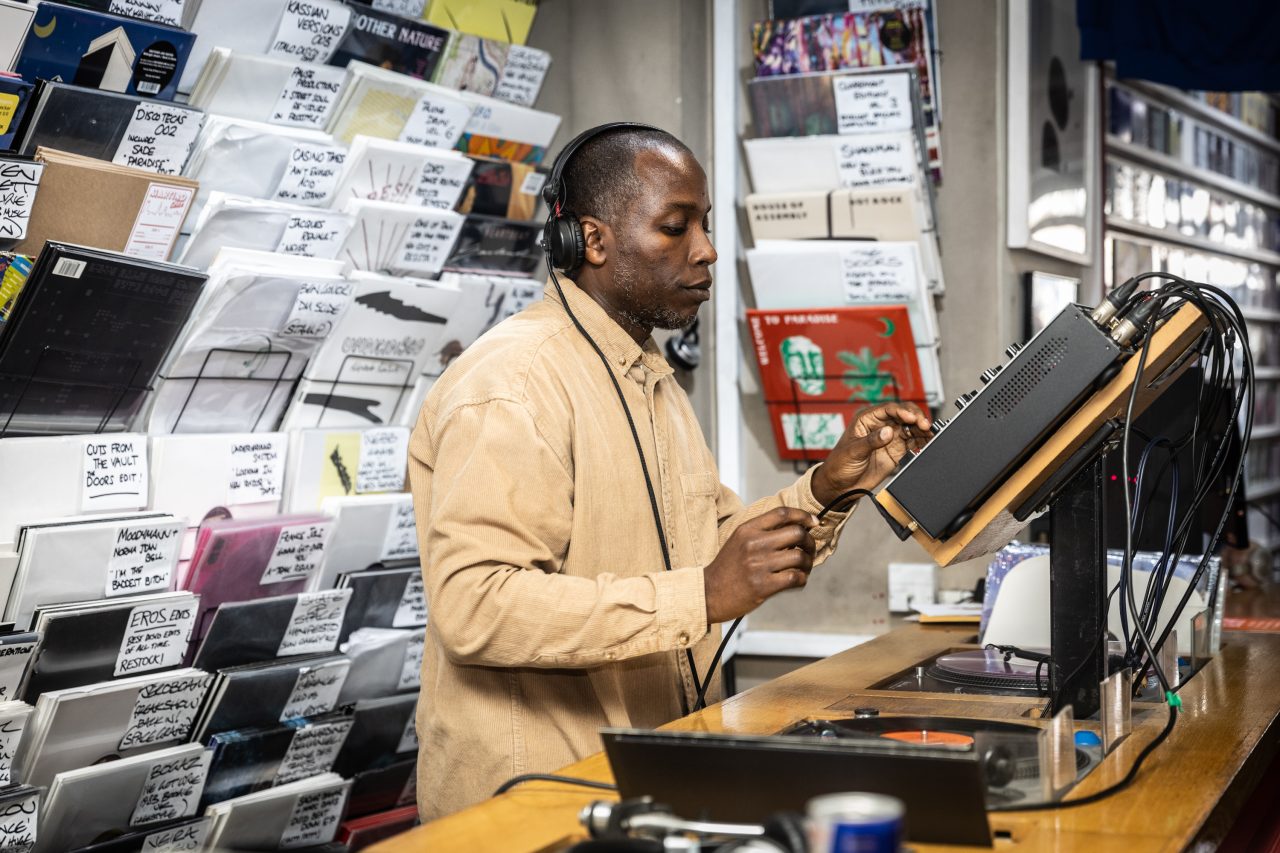
Phonica Records: London’s spiritual home for electronic and dance
In our new series, The Vinyl Factory explores what makes our favourite crate-digging spots so special. First up, Kelly Doherty speaks with Simon Rigg and Nick Williams at Phonica Records about the store’s goals, adapting to the vinyl resurgence and Phonica’s role in building community.
Nestled away in the heart of the ever-bustling Soho, London is a spiritual home for fans of electronic and dance music. Phonica Records, founded by Simon Rigg, Heidi Van Den Amstel and Tom Relleen in 2003, has spent the last 20 years weathering the winds of the vinyl market, providing a space for vinyl nerds, DJs and intrepid genre explorers.
Read more: Watch Phonica’s Record Store Day 2023 DJ sets
Whilst the vinyl market is famously experiencing an uptake right now, 2003 posed a much more barren landscape. “It was the worst time to start a record shop. They were all closing, just as we were opening,” explains Nick Williams, assistant manager at Phonica Records. Despite the harrowing climate, Phonica set out with a dream. “The goal of Phonica is to be the number one dance specialist in the UK,” Nick states plainly.

To affirm Phonica’s place in London’s musical landscape, the team immediately set about diversifying its output. “We weren’t content to sit around. To pull people in the door, and keep them and their interest–we started doing free in-store events, launched several record labels, did radio shows and promotional club nights,” Nick says.
Phonica’s magic rests both in its variety and its specialisation. Where many record stores are content to bundle the varying shades and genres of electronic and dance music under the wide-reaching title of “Electronic”, Phonica offers options for every niche from the instantly recognisable techno and house cuts to ‘Afro/Latin edits’, ‘Italo-disco/cosmic’ and beyond. “It’s a balance between embracing new music and moving with the times,” explains founder Simon Rigg. “We always stock a wide range of dance and electronic music–a lot that you can’t find elsewhere.”

This specificity makes Phonica a hub for discovery; “we aim to let people expand on what they hope to find and have fun discovering things they weren’t expecting to,” Nick says. With its up-to-date selection and a staff team that is deeply embedded in the music scene, Phonica is a one-stop shop for expanding your listening tastes–”recommending is a big part of what goes on here.”
Read more: 20 Years of Phonica tour dates
Phonica’s longevity keeps its audience varied and cross-generational. Whether it’s a Saturday afternoon or a midweek lunchtime, the floorboards of the store are trounced by an unclassifiable set of customers–DJs, tourists, families, vinyl enthusiasts, first-time record buyers–all united by a desire to explore the electronic music spectrum. “Obviously, we have had a lot of customers who have continued to shop here over two decades,” Simon explains. “But there’s a refreshing amount of younger people who are excited about buying new music on vinyl”.
http://thevinylfactory.com/wp-content/uploads/2023/05/20-years-of-phonica-dates-SHORT.mp4
Facilitating the theme of discovery is what Nick describes as “the UK’s hardest-working listening stations”. As you enter the door of Phonica, your eyes are immediately drawn to a row of turntables, perpetually swamped by shoppers holding bundles of vinyl, seeking an opportunity to try before they buy. Once a staple of record stores, listening stations have dwindled in popularity. However, they are a vital part of Phonica’s discovery-focused ethos.
“They’re quite difficult to maintain. They constantly break down from all the usage,” Nick laughs. “It’s worth it though because people love them”.

The last few years have posed a variety of developments for anyone in the vinyl industry. An uptake in vinyl consumption has resulted in shifting audience demographics and increased sales. However, amid this, the COVID-19 pandemic also came with a set of unique threats to any small business. Phonica, like many of its peers, faced a period of uncertainty throughout the pandemic and many of these issues remain, including a move towards buying releases online. “It’s tough out there with the price of records going up–record shops are in danger of disappearing completely in a few years if people just buy direct from labels or websites, ” Simon says.

One thing buying records online doesn’t provide is a sense of in-person community. Nick posits Phonica as operating within an eco-system of record stores in London, each with its own specialisations and goals. “As we all do slightly different things, we send a lot of customers to other stores and we get many people who’ve been sent to us. It works for everyone,” Nick says. “Customers sometimes get surprised, thinking we’re all competing, but we’re not. We were all there when shops were closing so it’s important to offer the information and support the independent market”.
In turn, Phonica houses a community within a community for its customers. “I see these chance encounters; customers giving a record to another customer and striking up a conversation or people bumping into a friend that they had no idea would be there.”

“People start talking about gear because they’re both producers or they discuss the releases coming up on the labels they run. The shop is a place for developing an eco-system between the club and labels and artists and audiences and it’s nice to see these conversations happen”.
As Phonica Records hits its 20th anniversary, it’s going from strength to strength. Whether it’s the inimitable record selection, a relentless in-store event schedule, the ongoing mix series or the store’s knowledgeable staff, time spent with any facet of Phonica is soup for the electronic soul.
Phonica Records is located at 51 Poland St, London W1F 7ND. Check out their selection at their online store.









